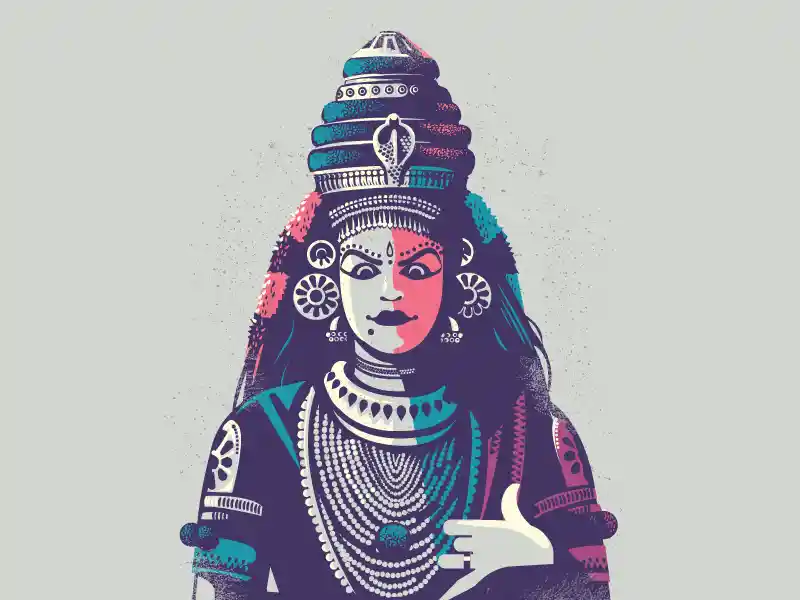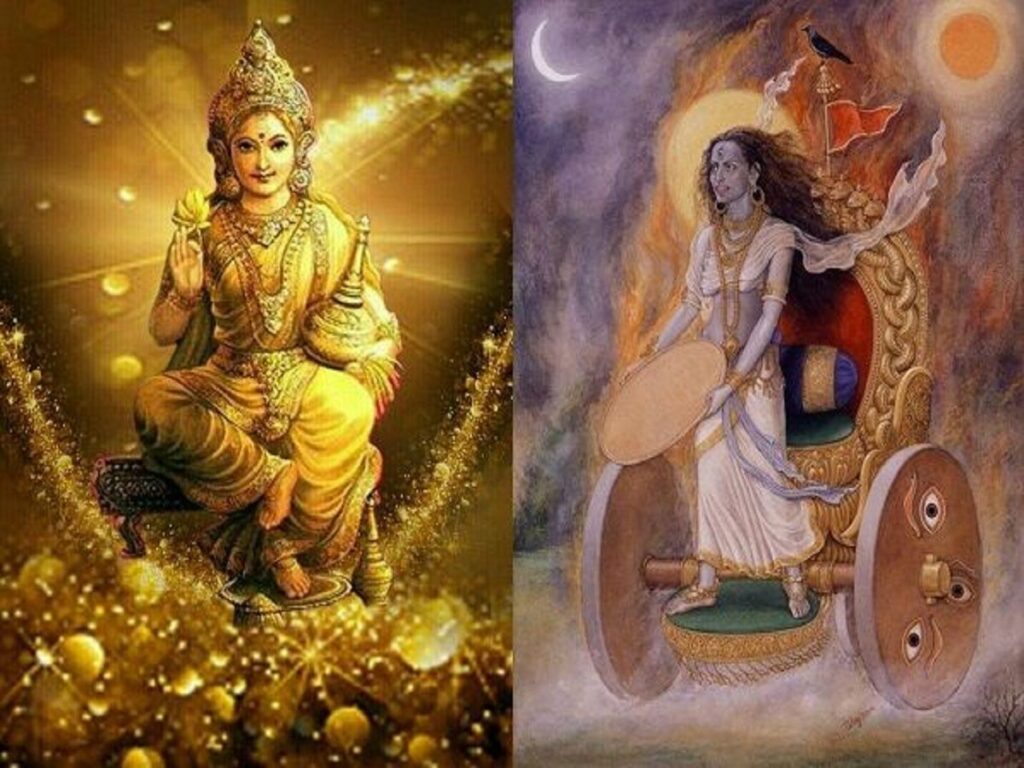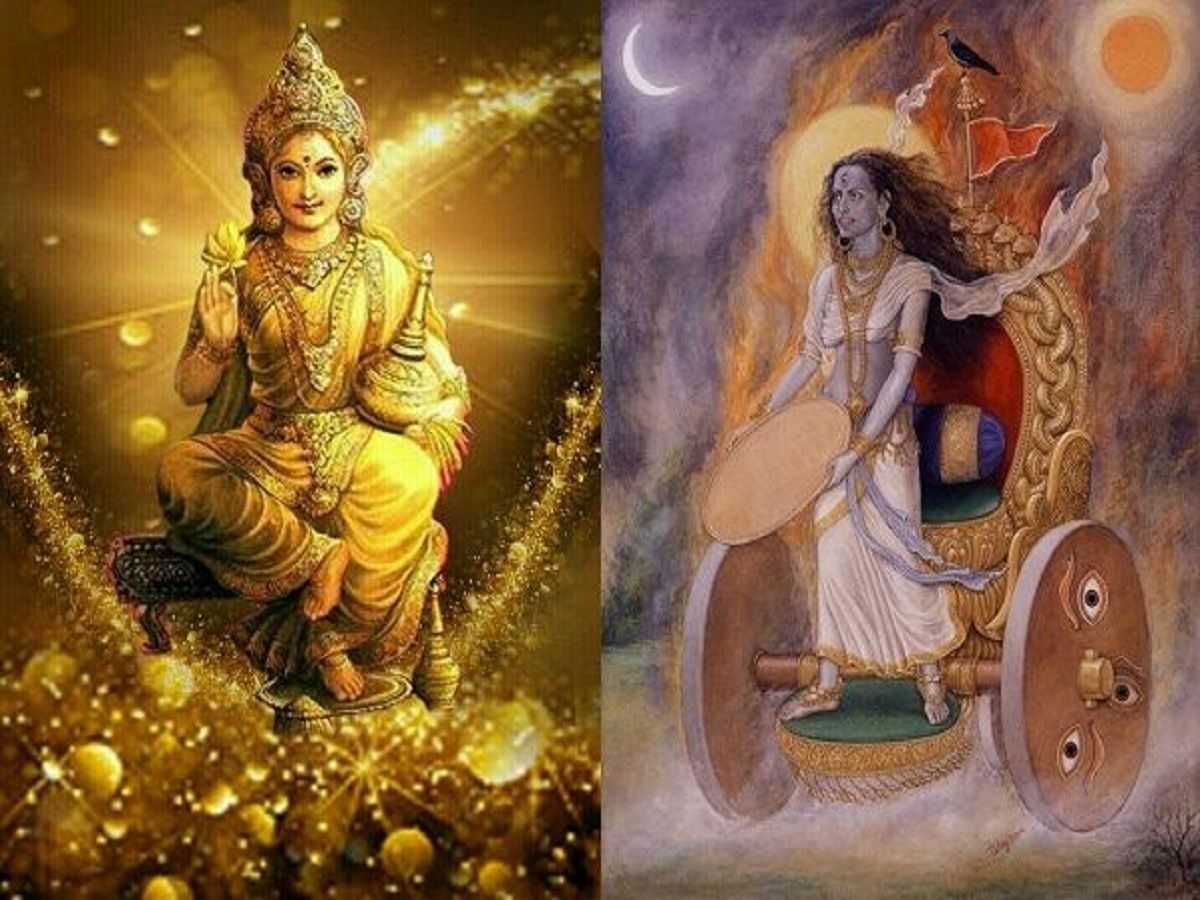Alakshmi is a term that means “not Lakshmi” in Sanskrit. She is often associated with misfortune and is described as having unusual physical features like repelling cows, having antelope-like feet, and being toothy like a bull.
Another description portrays her as having a withered body, sunken cheeks, thick lips, beady eyes, and riding a donkey. Kalki Purana and Mahabharata mention Alakshmi as the wife of Demon Kali who will cause havoc in KaliYuga.
Alakshmi is believed to dwell among malicious individuals, bringing poverty and grief. She symbolizes inauspiciousness and sorrow, contrasting with Lakshmi, who represents auspiciousness and joy.
Some sources equate Alakshmi with Jyestha. She is also known by names like Kalahapriya and Daridara. In households, Alakshmi was believed to bring jealousy and malice, causing conflicts between siblings and leading to the downfall of families.

Story of Alakshmi
According to the Padma Purana, during the cosmic event known as Samudra Manthana, both positive and negative forces are created. Alakshmi represents the negative aspects, while Lakshmi represents positivity. Alakshmi emerges first, followed by Lakshmi. So, she became the elder sister of Goddess Lakshmi and was called ‘Jyestha Devi’.
When Alakshmi asked the gods about her purpose and home, they told her to stay in the mentioned places (Padma Purana 4.9):
- Stay in the homes of those men where people argue.
- Stay with those who do evil.
- Bring suffering to the homes of those men who speak cruel and false words.
- Eat with mean people in the evening.
- Stay where there are skulls, hair, ashes, bones, and burning chaff.
- Bring sorrow and poverty to the homes of those mean men who don’t wash their feet before eating.
- Cause grief and conflict in the houses of those who clean their teeth with sand, salt, or charcoal.
- Stay in the homes of those mean men who eat mushrooms and leftover coconut.
- Stay in the homes of those men with sinful thoughts, who eat sesame flour, bottle gourd, garlic, young plant shoots, and onions.
- Stay in a place that lacks offerings to teachers and gods, where guests are not given gifts, and where the sound of Vedic recitation is absent.
- Stay in a place where there are fights between husbands and wives, where there is no worship of ancestors or gods, and where gambling happens.
- Bring sins and poverty to that place where there are adulterers and thieves who steal from others, and where Brahmins, good people, and elders are not respected.
Lord Vishnu before marrying Goddess Lakshmi, gave Jyesthadevi to Sage Uddalaka. She went with Uddalaka to his peaceful and beautiful hermitage where sacred hymns were chanted. However, Alakshmi couldn’t stand being there and quickly ran away. Uddalaka, confused, asked her why she left.

She explained that she didn’t want to stay in a place where Vedic recitations were heard, guests were respected, and rituals were performed. Instead, she preferred places where people gambled, stole wealth, committed adultery, slaughtered cows, drank, and even killed Brahmins.
Realizing that he couldn’t live with her, Sage Uddalaka took her to a forest and asked her to wait under an Ashvattha tree while he found a new place to stay. Unfortunately, he never returned, leaving Jyesthadevi alone. Eventually, she understood the situation and started crying. Her cries reached Vaikuntha, the abode of Lord Vishnu, and the goddess Lakshmi asked him to bring Jyesthadevi to Vaikuntha.
When Lord Vishnu approached Alakshmi and asked her to come with him, she refused. She explained that she couldn’t live in pure and virtuous places. Even if she went to Vaikuntha, she would bring negativity with her.
Therefore, Lord Vishnu told her to reside in homes where people argued, lied, gambled, and behaved immorally. Those unclean places would be her home. He also blessed her, saying that she would be worshipped every Saturday alongside him under the Aswastha tree, which is one of his forms.
There are some other popular stories behind the origin of Alakshi. Some texts mention that Lakshmi was born from the brightness of Prajapati’s face, while Alakshmi was born from his back. According to the Kartika Mahatmya, she was born from the mud that formed during a big flood when everything pure mixed with Narayana, and the impurities settled as mud in the water.
What to do if Alakshmi enters your house?

If Alakshmi enters your house, you will immediately feel stress, financial loss, arguments, fights, and immoral behaviors. You must drive away Alakshmi from your home by performing the Alakshmi Nissarana ritual on the night of Lakshmi Puja.
Buy a new broom and worship it. At midnight, the woman of the house should sweep the house with the broom. The garbage is collected in a winnowing basket and thrown out of the house. Then, make noise with the winnowing basket in every corner of the house, saying, Oh food, wealth, and Lakshmi, come inside and Alakshmi leave the house as Lakshmi has arrived.
Practicing cleanliness, selflessness, discipline, and hard work can also help keep Alakshmi away. Lemons and chilies are Alakshmi’s favorite food. Many Hindus hang them outside their homes or shops to prevent Alakshmi from entering. She eats the lemons and chilies and stays away.
Worshiping goddess Saraswati also helps keep away Jyeshtha Devi. Donating silk or cotton clothes during the Shraddha ceremony will chase away Alakshmi.

